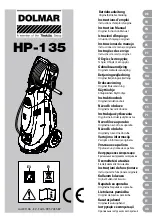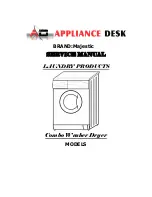
14
Installation Instructions
BEFORE YOU BEGIN
• Remove and discard existing plastic or metal foil
duct and replace with UL-listed duct.
• Remove any lint from the wall exhaust opening.
Internal
Duct
Opening
Wall
Check that exhaust
hood damper
opens and closes
freely.
STANDARD REAR EXHAUST
This dryer comes ready for rear exhausting. If
space is limited, use the instructions to exhaust
directly from the sides or bottom of the cabinet.
Slide the end of the exhaust duct on the back of the
dryer and secure with duct tape or a hose clamp.
NOTE:
We strongly recommend using rigid metal
exhaust duct. However, if flexible ducting is used it
must be UL-Listed metal, not plastic.
• For straight line installation, connect the dryer
exhaust to the external exhaust hood using duct
tape or clamp.
RECOMMENDED CONFIGURATION
TO MINIMIZE EXHAUST BLOCKAGE
Using duct elbows will prevent duct kinking and
collapsing.
EXHAUST SYSTEM CHECKLIST
HOOD OR WALL CAP
• Terminate in a manner to prevent back drafts or entry of
birds or other wildlife.
• Termination should present minimal resistance to
the exhaust airflow and should require little or no
maintenance to prevent clogging.
• Wall caps must be installed at least 12” above ground
level or any other obstruction with the opening pointed
down.
SEPARATION OF TURNS
• For best performance, separate all turns by at least
4 ft. of straight duct, including distance between
last turn and dampened exhaust hood (wall cap).
SEALING OF JOINTS
• All joints should be tight to avoid leaks. The male end
of each section of duct must point away from the dryer.
• Duct joints should be made air- and moisture-tight
by wrapping the overlapped joints with duct tape or
aluminum tape.
• Do not assemble ductwork with any fasteners that
extend into the duct. These fasteners can accumulate
lint, creating a potential fire hazard.
• Horizontal runs should slope down towards the
outdoors 1/4” per foot.
• Provide an access for inspection and cleaning of
the exhaust system, especially at turns and joints.
Exhaust system shall be inspected and cleaned at
least once a year.
INSULATION
• Ductwork that runs through an unheated area or is
near air conditioning should be insulated to reduce
condensation and lint build-up.
Wall Side
Dryer
Side
Duct Tape
Elbows highly
recommended
External duct
opening
Duct tape or
duct clamp
4” metal duct
cut to proper
length
Duct tape or
duct clamp
EXHAUSTING THE DRYER (cont.)
Summary of Contents for GUD27GSSM2WW
Page 18: ...18 Notes...
Page 19: ...19 Notes...
Page 20: ...20 Printed in Mexico...
Page 38: ...Notas 18...
Page 39: ...19 Notas...
Page 40: ...20...















































